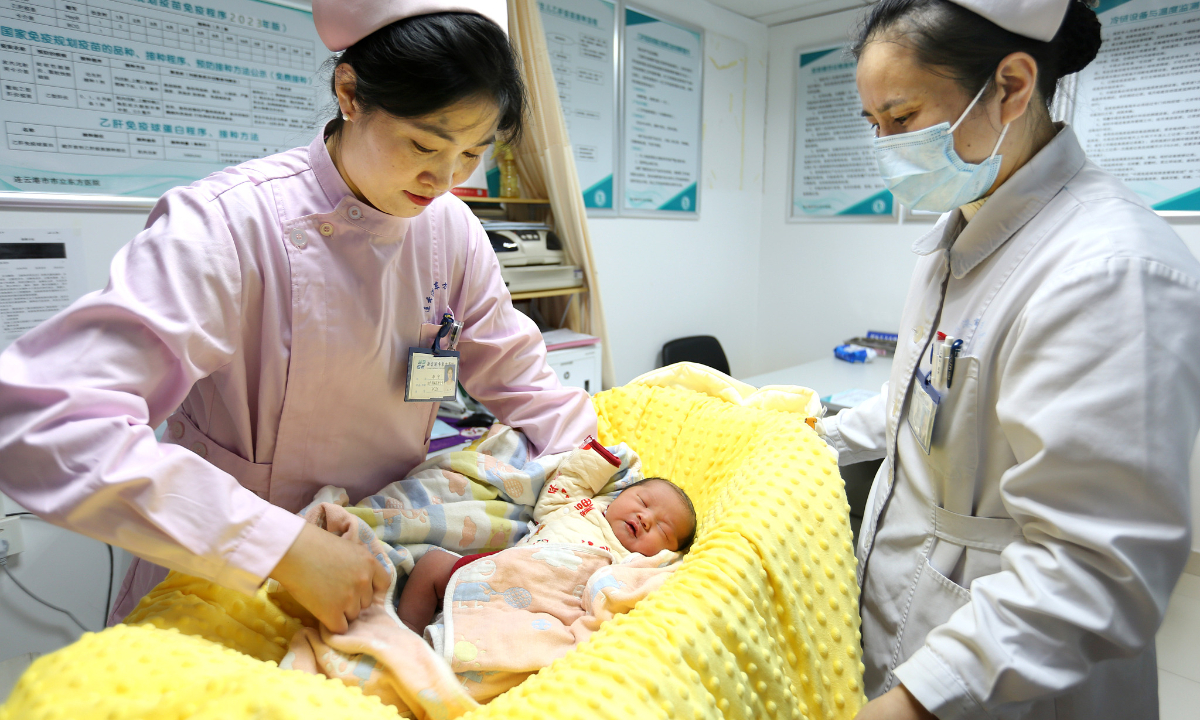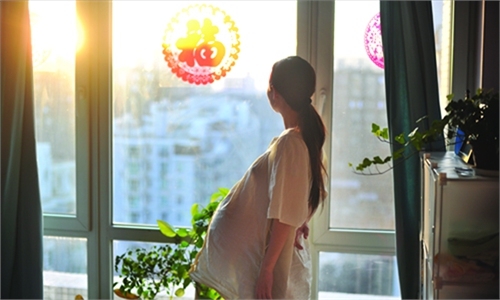Chinese experts forecast minor baby boom in the Year of Dragon due to cultural influence, post-pandemic rebound and policy support

Photo:VCG
Chinese medical staff and experts predict a minor baby boom in the Year of the Dragon due to triple impact of a preference for the dragon zodiac in Chinese culture, a rebound in fertility post-pandemic, and improving fertility support policies.
As of 8 am on Saturday, the first day of the Year of the Dragon, a total of nine dragon babies had been delivered in the Fudan University Affiliated Maternity Hospital. Between midnight and 8 am on Saturday, Shanghai First Maternity and Infant Health Hospital also received a total of seven dragon babies, local news portal in Shanghai thepaper.cn reported.
In the early hours of Saturday, at 1:47 am, a 3,057g baby girl was born at the Fengxian branch of the International Peace Maternity and Child Health Hospital of the China Welfare Institute in Shanghai. This marked the first dragon baby born in the hospital this year. By 8 am, a total of four dragon babies, including three boys and a girl, were born in the Fengxian District, according to the paper.cn.
"Many mothers were eagerly awaiting the birth of their dragon babies," Hu Yanjun, the head of the Obstetrics Department at Wenzhou People's Hospital, was quoted as saying by the paper.cn. The hospital received its first newborn on the first day of the Chinese Lunar New Year at 8:08 am on Saturday.
Medical staff in the obstetrics and gynecology department at the Binhu Hospital of Hefei First People's Hospital in East China's Anhui Province also stayed up all night, welcoming four rabbit babies and four dragon babies. Niu Yuwei, deputy chief physician of the department, said they expect a small baby boom in the Year of the Dragon as dragon is considered auspicious in Chinese culture.
In accordance with the lunar Chinese calendar, the year 2024 will be the Year of the Wood Dragon. Dragon is the totem of Chinese nationality that symbolizes power, nobility, and intelligence. Combined with Wood, which holds the meaning of growth, development, and prosperity in Chinese wuxing (five elements) culture, 2024 is forecasted to bring about opportunities, changes, and challenges.
As China faces a crucial point in its economic recovery, the Year of the Dragon inspires great expectations for new life and new arrivals among Chinese people.
As early as the Year of the Rabbit, there was a noticeable increase in prospective parents planning to have dragon babies, media reported.
Zhai Zhenwu, president of the China Population Association and a professor at Renmin University of China, has previously told media that Chinese people have a special preference for the zodiac sign "dragon," and during the previous Year of the Dragon in 2012, there was a baby boom. Considering these factors, it is expected that the birth rate in 2024 will see a significant increase.
China's population decreased by 2.08 million people in 2023 to 1.40967 billion, the National Bureau of Statistics (NBS) data showed in January. In 2023, 9.02 million babies were born, resulting in a birth rate of 6.39 per thousand people.
Yuan Xin, a professor from the Institute of Population and Development at Nankai University's School of Economics, told the Global Times that he agreed with Zhai regarding the baby boom across the coming year.
The boom is a result of the impact of three effects: first, the preference for the dragon as zodiac in Chinese culture. A similar baby boom occurred on the Chinese mainland in 2012 as well as in previous years of Dragon in the Taiwan island; second, a rebound in fertility due to the effects the post-pandemic, the expert said.
A serious wave of COVID-19 hit China at the end of 2022 and the early beginning of 2023. Some doctor suggest people do not have babies until three months after they recover from COVID-19. This led to delayed birth of many babies, Yuan noted.
Third, improving fertility support policies in China will also encourage people to have larger families, Yuan noted.
While the country welcomed 9.02 million newborns in 2023, the expert estimated that the number would increase in 2024, but it is hard to predict to what degree.


